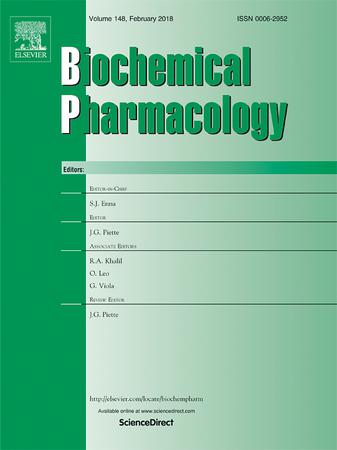In vitro pharmacological evaluation of the novel NOP receptor partial agonist sunobinop
IF 5.3
2区 医学
Q1 PHARMACOLOGY & PHARMACY
引用次数: 0
Abstract
Sleep-related disorders affect a significant portion of the global population. The nociceptin/orphanin FQ (N/OFQ) peptide (NOP) receptor has become a promising candidate for the development of innovative drugs to treat sleep disorders. In this study, we conducted an in-depth pharmacological characterization of sunobinop, a selective NOP receptor partial agonist already under clinical evaluation for treating multiple conditions including insomnia, using a wide range of in vitro and ex vivo methodologies. Sunobinop exhibited partial agonist activity in calcium mobilization, NOP − G protein interaction, label-free bioimpedance, and cAMP inhibition assays. Notably, it demonstrated competitive antagonism in the NOP – β-Arrestin 2 recruitment and ex vivo electrically stimulated mouse Vas Deferens, assays characterized by low amplification. The findings reported here confirm and extend the characterization of sunobinop as a tool for studying NOP receptor pharmacology providing new insights into its mode of action, relevant to its clinical evaluation.

新型NOP受体部分激动剂sunobinop的体外药理学评价。
与睡眠有关的疾病影响着全球很大一部分人口。痛觉肽/孤儿蛋白FQ (N/OFQ)肽(NOP)受体已成为开发治疗睡眠障碍的创新药物的一个有希望的候选者。在这项研究中,我们对sunobinop进行了深入的药理学表征,sunobinop是一种选择性NOP受体部分激动剂,已经在临床评估中用于治疗包括失眠在内的多种疾病,使用了广泛的体外和体外方法。在钙动员、NOP - G蛋白相互作用、无标记生物阻抗和cAMP抑制试验中,Sunobinop表现出部分激动剂活性。值得注意的是,它在NOP - β-Arrestin 2募集和体外电刺激小鼠输精管中表现出竞争性拮抗作用,其特点是低扩增。本文报道的研究结果证实并扩展了sunobinop作为研究NOP受体药理学的工具的特征,为其作用模式提供了新的见解,与临床评估相关。
本文章由计算机程序翻译,如有差异,请以英文原文为准。
求助全文
约1分钟内获得全文
求助全文
来源期刊

Biochemical pharmacology
医学-药学
CiteScore
10.30
自引率
1.70%
发文量
420
审稿时长
17 days
期刊介绍:
Biochemical Pharmacology publishes original research findings, Commentaries and review articles related to the elucidation of cellular and tissue function(s) at the biochemical and molecular levels, the modification of cellular phenotype(s) by genetic, transcriptional/translational or drug/compound-induced modifications, as well as the pharmacodynamics and pharmacokinetics of xenobiotics and drugs, the latter including both small molecules and biologics.
The journal''s target audience includes scientists engaged in the identification and study of the mechanisms of action of xenobiotics, biologics and drugs and in the drug discovery and development process.
All areas of cellular biology and cellular, tissue/organ and whole animal pharmacology fall within the scope of the journal. Drug classes covered include anti-infectives, anti-inflammatory agents, chemotherapeutics, cardiovascular, endocrinological, immunological, metabolic, neurological and psychiatric drugs, as well as research on drug metabolism and kinetics. While medicinal chemistry is a topic of complimentary interest, manuscripts in this area must contain sufficient biological data to characterize pharmacologically the compounds reported. Submissions describing work focused predominately on chemical synthesis and molecular modeling will not be considered for review.
While particular emphasis is placed on reporting the results of molecular and biochemical studies, research involving the use of tissue and animal models of human pathophysiology and toxicology is of interest to the extent that it helps define drug mechanisms of action, safety and efficacy.
 求助内容:
求助内容: 应助结果提醒方式:
应助结果提醒方式:


